We're now a month into 2020!
As usual for a new year, I'll be doing my annual countdown of my favorite movie characters from the previous year, delving both into why I liked them as a fan, and what theological lessons they can help teach us as Christians (As a "Be like them" example, a "Don't be like them" cautionary tale, or an allegory for a Biblical figure or principle). All the same rules as before apply:
They are not in any particular order of preference.
It could be an original character, or a cinematic adaptation of an already- existing character.
It could be a brand- new character making a breakout appearance, or an already- established character that we see more of and learn more about.
It could be from any genre of film.
It can be any type of character, be it hero, antihero, villain, or supporting character.
DISCLAIMER! Some of the characters are from films with objectionable subject matter, look into them before seeing them or letting your kids do so.
SPOILERS! I'll try not to spoil too much, but to better convey why I like these characters and the lessons they teach, I may need to delve into some major plot points.
Now, let's get this party started!
1. Mr. Harrington, 'Spider- Man: Far From Home.'
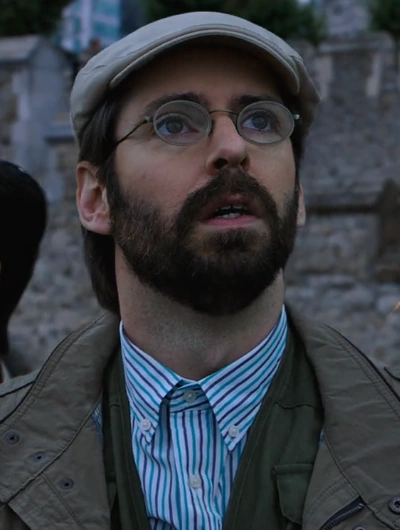
(Credit for this image goes to the user DrStrange177 at the Spanish Marvel Cinematic Universe wiki at https://marvelcinematicuniverse.fandom.com/es/wiki/Roger_Harrington?file=Roger_Harrington.png)
Yes, strange though it may sound, one of the characters in 'Spider- Man: Far From Home' who stuck out for me the most was Mr. Harrington, Peter Parker's long- suffering science teacher. He makes for one of quite a few great and hilarious comic- relief characters in this funny and thrilling sequel.
This is a man who's had life kick dirt in his face so many times, and it's continuing to do so as he helps chaperone his class on a tour of Europe over the summer. We learn on the flight over that his wife pretended to have been among those wiped out in Thanos's "Snap" at the end of 'Avengers: Infinity War,' when she really just ran off with another man (As he sadly explains, "We had a fake funeral for her and everything... Well, the funeral was real. 'Cause we thought she was really dead."). He accidentally drops his camera in a river at their very first stop. The museum in Venice that he intended to take his class to was in fact closed and would be for several more months (This is why you do a little more research before the trip, and make contingency plans).
Still, Mr. Harrington puts on the best face he can and takes the most optimistic attitude he can in order to make the most of the trip for his students' sake, and make it as fun for them as possible. His optimism in the face of such hardship is rewarded ultimately, as he and the students end up having the second half of the trip be quite enjoyable (Other than almost getting killed as a result of the villain's actions, that is). Even during the life- threatening moments, Mr. Harrington stays as optimistic and calming as possible and remains a good leader to the class, putting more priority on protecting the students entrusted to him than on whining about the problems he's gone through. Just like what a good teacher should do in such circumstances.
Keeping a positive outlook even when facing bad luck the way Mr. Harrington does is a Biblical concept. Psalm 30:5 says that "...Weeping may last through the night, but joy comes with the morning." Furthermore, Romans 8:18 says "For I consider that the sufferings of this present time are not worth comparing with the glory that is to be revealed to us." It's about holding out when hardships come, knowing that happy times will eventually return, and not letting our current hardships stop us from serving God and our fellow man.
It's rather strange that, for a science teacher, the most valuable lesson Mr. Harrington would have to teach us would have nothing to do with science. That's part of why he's such a fun character who's earned his place on my list.
We now go from a high school teacher to a high school student (Albeit one who was in high school about forty years earlier):
2. Daniela, 'Annabelle Comes Home.'

(Credit for this image goes to the site/ article https://blackgirlnerds.com/meet-the-cast-of-annabelle-comes-home/)
The terrifying 'Conjuring' cinematic universe (Including not just the actual 'Conjuring' movies, but also spinoffs like the 'Annabelle' series, 'The Curse of La Llorona,' and 'The Nun') just keeps growing, and the latest entry in it, 'Annabelle Comes Home,' is one of my favorites of it. Scary, exciting, funny at times, it has great performances, and I could see it helping to spawn even MORE spinoff films to help reveal the origins of some of the cursed/ haunted objects in Ed and Lorraine Warren's occultic artifacts room that come to life in various freaky ways in this film. In particular, the suit of Japanese samurai armor in it I could see having a really fascinating backstory that could potentially make for a great spinoff movie, and don't get me started on the creepy wedding dress in it (Let's just say those who put it on appear to give new meaning to the phrase "'Til death do us part.").
Anyway, on to Daniela. When the Warrens are going out of town for a few days and put teenage babysitter Mary Ellen (Madison Iseman, I swear it's just a coincidence that she keeps popping up in my Favorite Movie Characters lists in one way or another!) in charge of watching their daughter Judy, and shortly after they're gone, Mary Ellen's outgoing friend Daniela invites herself over to the house. She sneaks into the artifacts room and begins curiously examining and even touching several of the items there, such as the demonic "Annabelle" doll. We soon learn that she does this because she recently lost her father in a car accident that she wrongfully blames herself for, and she wants badly to contact his spirit and apologize to him for it, and upon learning of the Warrens' connection to the afterlife, figures that they and the various occultic artifacts they possess can enable her to do so. While in the artifacts room, she at one point actually says, "If there is a presence here in this room, please give me a sign. Any sign at all."
Unfortunately, as you can probably guess, that was a REALLY bad idea. This invitation enables the various evil and demonic spirits connected to the artifacts to come out and play, with the Annabelle doll at the forefront.
Even though the horrible things that the heroes are put through in the film are pretty much entirely Daniela's fault, it doesn't impact her likability as much as you'd think. We still see she's a nice enough girl who's funny, outgoing, and a good friend to Mary Ellen who encourages the latter to come out of her shell more and talk to a guy she likes (She's sort of like a gender- swapped version of my best friend Jon in that way). She also helps Judy learn to be more resilient towards the bullying she faces from her classmates over what her parents do, via a nice pep talk she gives while Judy is feeding chickens. Plus, again, learning about the reason why she was so interested in the Warrens' occult artifacts, and that it wasn't just a simple matter of stupid "Ooh, ghosts are cool, lemme see" curiosity, helps her become more sympathetic. Lastly, in the end, she does manage to help end the horror by aiding in getting the Annabelle doll locked back up where it belongs, and even helps ensure that Judy's upcoming birthday party proves to be a big success. Combine that with a great performance by Katie Sarife, and you have a very effective character who brings a lot to the movie.
The theological point that Daniela helps to bring up is the vital importance of not fooling around with the occult. While it is understandable that she'd want closure relating to her father's death and even to want to talk to him one final time and tell him how sorry she is over the role that she believes that she may have played in his death, her making the incredibly foolish decision to try and use the cursed/ haunted objects in the artifact room and the unclean spirits they contain to do so sets into motion a nightmarish ordeal that nearly gets herself and several others killed or worse.
I believe that there is indeed an "Other side," but that it is something that REALLY shouldn't be messed with, as the potential to inadvertently release something truly evil in that way is through the roof. That includes consulting with supposed "Psychics" or "Mediums"; Most are just frauds who know a few parlor tricks to con tourists out of their money, but the few who have actual power get it from VERY dark and undesirable sources that can demand a major price. Even fooling around with things like Ouija boards can be a gateway to evil forces.
Leviticus 19:31 says clearly, "Do not turn to mediums or spiritists; do not seek them out to be defiled by them. I am the Lord your God." For another example, King Saul's seeking out the services of a witch to try and contact the spirit of the deceased prophet Samuel ended up costing him and his sons their lives, and leading to Israel's army being defeated by the Philistines.
Attempting to contact the dead or get involved in anything supernatural not Godly in nature is a really bad idea. It won't help anyone, and it can produce truly horrific consequences, especially if done by a complete amateur like Daniela.
Still, Daniela made for a very enjoyable, sympathetic character who brought a lot to her movie. Let's just hope she stays away from cursed and haunted artifacts from now on.
For the next entry on the list, we'll be looking at someone who has a lot in common with Daniela: Similar generation (Teenager in the late 1960's- mid 1970's), same interest in creepy things that gets her and others into a lot of trouble, and same struggle with guilt. Heck, her first name even rhymes with Daniela!
3. Stella Nicholls, 'Scary Stories to Tell in the Dark.'
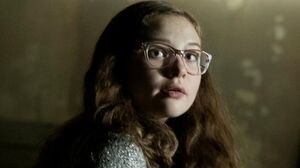
(Credit for this pic goes to the user Dalvin98 on the Heroes Wiki at https://hero.fandom.com/wiki/Stella_Nicholls?file=StellaNicholls-SSTTITD.jpg)
I really did enjoy the 'Scary Stories to Tell in the Dark' movie (Based on the controversial book series of the same name), for a lot of reasons. It had decent scares for a PG- 13 movie, good characters, GREAT creature effects (The assorted monsters look just like they did in the original book's frightening yet gorgeously- drawn illustrations, with my hands- down favorite being the vengeful scarecrow Harold), nice twists, and even some pretty astute and well- handled social commentary. One of the best parts of it is the main character, Stella.
An aspiring writer with a love of scary stories, Stella and a group of her friends get a lot more than they bargained for when, in a house rumored to be haunted by the ghost of a woman named Sarah Bellows, she discovers a book full of scary stories written by Sarah and soon finds some of them coming to life in VERY unpleasant ways. While she had already been wrestling with things like being bullied, feeling guilt over her mother running off when she (Stella) was a little girl, dealing with writer's block, and her starting to develop feelings for the charming town newcomer, NOW she also has to concern herself with protecting her friends and herself from the story monsters coming to life.
She still proves to be smart, witty, brave, a good leader, and manages to prevail against the dark powers stalking her, and even wins the scary- story- writing contest she had entered!
As for the theological point to be taken from Stella, that makes for an interesting point. 'Scary Stories to Tell in the Dark' deals with themes of stories and the power they can have to reveal or conceal things, truth, and handling guilt. Stella faces struggles relating to all of these, and they are Biblical concepts as well. We eventually see that the book and the stories contained therein were written by Sarah Bellows as a way of helping to bring to light the truth about something horrible that her rich, influential family had done and then covered up. In the film's climax, Stella manages to pacify Sarah's angry spirit and bring all this horror to an end by openly revealing this dangerous family secret that Sarah had wanted to expose to the world. Some people believe her, some don't, but what matters is that she became an agent of truth, using her talent for writing and creating stories to help reveal it.
The pursuit of truth is very important to followers of Jesus. He Himself said in John 8:32 that "and you (Followers of Jesus) will know the truth, and the truth will set you free." It might be easier or more palatable to accept a lie, but knowing and revealing the truth is what genuinely liberates people and lets them live in Jesus to the fullest. The Apostles and other leaders in the early church believed this so strongly that they were willing to endure persecution, imprisonment, torture and death for the sake of bringing the truth of the Gospel to those who needed to hear it. Much like with Stella revealing the Bellows family's dirty secret, some believed them about Jesus, and some didn't, but what matters is that those early heroes of the faith did what they were supposed to do: Talk about Jesus, and share His truths to the world. May we all be willing to do the same.
This "Creepy train" portion of my list has one more stop to make before heading into slightly more cheerful territory, so let's keep on chuggin':
4. Wednesday Addams, 'The Addams Family.'

(Itay66647 https://hero.fandom.com/wiki/Wednesday_Addams?file=Wednesday_Addams_2019.jpg)
The new 'Addams Family ' animated movie was a real mixed bag for me. Some parts of it worked great (i.e. the humor, most of the voice acting), others didn't (i.e. the message was a little too preachy, and I'm not fond of Gomez's physical appearance in it). Fortunately, one thing about it that worked perfectly was Wednesday!
They pretty much nail every part of her perfectly. Her animated design looks great (One detail about her that I love is we see her braids are styled to resemble nooses; That's a really creative touch and fitting for her), I knew even before seeing the movie that Chloe Grace Moretz would be a marvelous choice for voicing her and indeed she was, and we also get some pretty deep looks at Wednesday's personality.
We soon see that, while Wednesday is content in her current environment, staying in the massive Addams mansion with her family, she also harbors some curiosity as to the outside world beyond the house, which she has never seen before.
Wednesday ultimately adjusts to this outside world in a great way. She becomes open- minded as to some of what it can offer, finds ways to change it for the better (i.e. A scene where she is in a biology class and hilariously turns the tables on the school's nasty "Queen bee"), and yet remains at heart an Addams, refusing to submit to the ideas of blind conformity that the town tries to force on her and still devoted enough to her family that she helps to save them from an angry mob in the film's climax.
Wednesday maintaining this balance between getting out and trying things with curiosity and open- mindedness yet remaining true to who she is inside reminds me of the important guidance we as Christians receive to be IN the world, but not OF the world. We cannot just shelter ourselves from the world and all the good it can offer, yet we also must remain committed to what we believe in and not compromise for the sake of fitting in. Colossians 3:2 advises believers "Set your minds on things above, not on things of this world." Jesus said in John 15:19 that "If you were of the world, the world would love you as its own; but because you are not of the world, but I chose you out of the world, therefore the world hates you." We need to be out and active in the world, but know that it's not our eternal home, and be true to ourselves as Christians.
That’s my take on Wednesday Addams. I guess you could say her making my list was a real “Snap.”
https://www.youtube.com/watch?v=zOYpduX68js
Now, we go from someone dark and spooky, to someone clean- cut and wholesome:
5. Prince Phillip, 'Maleficent: Mistress of Evil.'

(Sorry, this was the best picture of him I could easily get. Credit for this image goes to the user Valyrian Wildfire on the Maleficent wiki at https://maleficent.fandom.com/wiki/Prince_Phillip?file=Maleficent_Mistress_of_Evil_38.jpg)
As great a movie as the first 'Maleficent' was, Prince Phillip was honestly just kind of an afterthought in it. In the sequel, 'Maleficent: Mistress of Evil,' in contrast, he's a quite well- handled supporting character. We see his kingdom, his parents, and get more of an idea of how he feels relating to Maleficent. We also see how torn he becomes over the various loyalties he has, to his family, to his kingdom of Ulstead, to his love Aurora, and so on.
Phillip especially earns my praise for the film's climax. We see him caught in the middle of a bloody battle between his kingdom's army, headed by his scheming and bigoted mother Queen Ingrith, and Maleficent's race of Dark Fey. Phillip quickly realizes that he, as a soon- to- be ruler, has a responsibility to try and bring an end to all this pointless fighting and bloodshed and bring about peace.
During the battle, after pretty awesomely leaping off a tower and gliding down to the ground with a kite- thing, Phillip comes across his friend Percival, the Captain of the Guard, and convinces him to stand down, but then they are interrupted by the aggressive Fey warrior Borra. Phillip holds his sword to Borra’s neck to keep him from attacking Percival, and tells Borra “Stand down! This is not my fight! My mother wanted a war, and you are giving it to her. I won’t allow her hatred to ruin my kingdom or yours! (Lowering his sword from Borra’s neck) There will be no Fey blood on my hands.” At this, he drops his sword. Borra (Whose hatred of humans up to that point rivaled Queen Ingrith’s hatred of the Fey) is moved by this display of mercy and goodwill from a human, and he flies off, helping to convince his people to bring an end to the fighting while Phillip and Percival do the same to the royal soldiers on their side. So, a bloody war is averted and an alliance is formed between Ulstead and the Fey, all because of Phillip’s courageous commitment to peace.
In that sense, I’d say Prince Phillip made a perfect demonstration of Jesus’s
remark in the Sermon on the Mount in Matthew 5:9, that “Blessed are the
peacemakers, for they shall be called children of God.”
We too should strive to bring peace where we go. We may not be called upon to get warring faction leaders in a battle to lay down their arms, but we could be called upon to help arguing relatives, coworkers, or friends to help bury the hatchet with each other and become more civil.Civility is becoming an increasingly rare commodity nowadays, but we as followers of Jesus need to help bring more of it to the world as a sign that we serve Jesus.
So, there we have Prince Phillip. A great character who helps set a great example on working for peace. Ulstead is in good hands with him preparing to be king.
Now, we go from someone who becomes a force for peace and justice, to someone who becomes a force for terror and chaos:
6. Arthur Fleck/ The Joker, 'Joker.'

(Credit for this pic goes to the user NerdWithAKeyboard at https://villains.fandom.com/wiki/Joker_(2019)?file=2019Joker.png)
Many iconic characters, as time goes on, are portrayed in vastly different ways as different writers and actors come up with their own interpretations of them, and Batman's nemesis the Joker is a perfect example of this. Some versions of Joker have made us laugh (i.e. Caesar Romero in the Adam West series), some versions have made us scream and cringe in fear (i.e. Heath Ledger's version in 'The Dark Knight'), and some versions manage to effectively balance the two extremes (i.e. Mark Hamill's version in the animated series and the 'Arkham' video games). Joaquin Phoenix's version of Joker, however, is the only version I've seen that could make us cry.
We see that he had been a man named Arthur Fleck, a clown/ aspiring stand- up comic with a whole laundry list of problems plaguing his life; Career issues, an aging and rather unbalanced mother, a neurological condition that causes him to burst out laughing at inopportune moments, a practically neverending list of people who bully and mistreat him in one way or another, and a lifelong struggle with depression and mental illness that nobody in his life seems to care about or really want to help him through. Unlike with the previous example of Mr. Harrington on this list, though, none of these problems are played for laughs. Indeed they shouldn't be, considering that these all cause him to slowly turn into one of the most monstrous characters in all of fiction.
The tipping point is when, shortly after being fired from his clowning job, Arthur is accosted on a subway train by a group of Wall Street- types. When their harassment of his crosses the line into physically attacking him, Arthur finally has enough and kills them all. When Gotham's public learns that someone dressed as a clown killed those guys, he's seen as a kind of figurehead that unwittingly launches an Occupy Wall Street- esque social activism movement that quickly gets violent and chaotic, and things just kind of go from there.
Joaquin Phoenix gives an honestly brilliant performance throughout the movie, as we see Arthur trying so hard to make something of himself and do some good in his life and bring laughter and happiness to others, only to slowly slide into madness due to a variety of factors. I'll really be rooting for him to hopefully win the Oscar for Best Actor in a couple weeks.
The important theological lesson to be taken from Arthur Fleck concerns the dangers of apathy, especially when it comes to those with already troubled minds or emotions like him. He shows the kind of person who most clearly needs someone to reach out to him with Godly love and compassion. A little real kindness or care shown to Arthur could very easily have helped to save him and make his life turn out differently. As it is, though, the people's apathy and cruelty towards him pushes Arthur completely over the edge.
A scene that sums this up is near the end of the movie, when he appears on the talk show of his comedian idol, Murray Franklin (Another excellent character in the film, played by Robert De Niro). Arthur has completely become the Joker by this point, and while openly reveling in the brutal things he's already done/ been driven to do, he tells a "joke" which essentially acts as the film's main message: "What do you get when you cross a mentally ill loner with a society that abandons him and treats him like trash? I'll tell you what you get: YOU GET WHAT YOU ****ING DESERVE!"
In the multiple mass- shootings that the US has been plagued by in recent years, I've observed that there is one common factor that unites nearly all of them: In nearly every case, the shooter wasn't some regular, happy- go- lucky guy who one day just suddenly snapped out of nowhere. Rather, it was someone who had amply demonstrated symptoms of severe mental illness and the warning signs that a person was at risk of committing a violent act (Much like Arthur did in the movie), but nobody cared enough to do anything about it until it was too late. It was someone whose friends and family KNEW he was dangerous, but they didn't lift a finger to get him the help he needed.
The Bible is littered with condemnations of such apathy. In Psalm 17:10, it says "(The wicked) close their hearts to pity; With their mouths they speak arrogantly." 1 John 3:17- 18 says "But if anyone has the world's goods and sees his brother in need, yet closes his heart against him, how does God's love abide in him? Little children, let us not love in word or talk but in deed and in truth." Our caring for others, especially those who are needy and hurting, is how people can tell that we have God's love within us.
For the next character on my list, we look at another lost soul, but unlike Arthur, this is one who actually DOES end up getting the help she needed:
7. Gabby Gabby, 'Toy Story 4.'
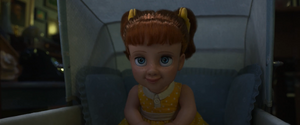
(Credit for this image goes to the user Markim99 on the Villains Wiki at https://villains.fandom.com/wiki/Gabby_Gabby?file=Gabby_Gabby_02.png)
Alas, poor Thanos. The same thing happened regarding him in 'Avengers: Endgame' that happened last year regarding 'Avengers: Infinity War': Just when he seemed a shoo- in to win the title of being my favorite movie villain of that year, he got booted from the top spot by a newcomer with the initials of G.G.. Last time, it was by Gellert Grindlewald, this time it's by a talking doll named Gabby Gabby.
'Toy Story 4' makes for a very good film, and a nice way to end the 'Toy Story' saga, and one of the most intriguing elements of it was definitely this troubled doll.
Gabby was an old- school talking doll, but unfortunately, while her record with all of her talking- doll phrases was fine, her voicebox was defective and gave her recorded phrases a really creepy sound. Because of this, no child would play with her and she spent decades living in an antique store, hoping that she might someday get an opportunity to be played with, preferably by the store owner's young granddaughter Harmony. Then, Woody comes along. As he is a talking doll made in around the same time period as her, she realizes his voicebox would likely be a perfect replacement for her own defective one. She becomes determined, one way or another, to get that voicebox.
Eventually, Woody agrees to let her have it, partly because in exchange she returns to him "Forky" (Another delightful new character who had become Bonnie's new favorite toy, and whom Gabby had been sort- of holding hostage, though they seemed to be on pretty friendly terms throughout it), and partly because he realizes Gabby meant no real malice, but merely wanted to know what it felt like to be loved by a child and to help build the kinds of happy memories for them that Woody had built for Andy and then for Bonnie.
Her recorded phrases now sounding clear as a bell, they arrange for Gabby to be put somewhere that Harmony will find her. When given the opportunity to take her home, though, Harmony decides not to and callously tosses Gabby aside.
Harmony's rejection leaves Gabby heartbroken, but Woody reminds her that there are so many children out there who would love and cherish her. Gabby decides to help Woody and his friends with the rest of their quest any way she can, and along the way, she meets a lost girl at a fair, someone who much like her, is feeling sad and alone. Woody and the others help the girl to discover Gabby. The girl instantly takes a liking to her and keeps her, at long last providing Gabby Gabby with the love of a child that she had dreamed of for so long.
Gabby Gabby sticks out as being, unquestionably, THE most sympathetic antagonist of any Pixar film. Even when she gets a little cuckoo in some scenes, she's never really evil, and you can easily see where she's coming from. Christina Hendricks's soft, soothing voice fits Gabby like a glove; When she is antagonistic towards Woody and co. early in the film, it makes her lines sound more creepy and menacing, but when we eventually see her more sympathetic side and how desperately she just wants to be loved, it makes her sound all the more heart- meltingly poignant. If the scene of her finally getting that wish granted near the end doesn't have you in tears, I strongly suggest someone check you for a pulse.
The Biblical lesson that can be taken from Gabby Gabby is on second chances. After being rejected by Harmony, Gabby miserably tells Woody, "She was my chance; My time is over."
As someone who similarly went through an extremely painful loss this last year, I was left feeling initially a LOT like how Gabby felt at that moment, like I had just lost my one and only chance at love and happiness. However, similar to how Woody assures her that she can have plenty of fresh chances to find a child who will accept her, we serve a God who always has love and mercy towards us, and is always ready to provide us with another chance. Lamentations 3:21- 23 says "But this I call to mind, and therefore I have hope: The steadfast love of the Lord never ceases; his mercies never come to an end; they are new every morning; great is your faithfulness." Now, without going too much into detail, I like Gabby have learned that there is fresh hope for me to find love and joy in life.
That about sums up Gabby Gabby; Who would have guessed that a damaged (Physically and emotionally) doll could convey such a beautiful message of hope and redemption?
Some of my other picks for memorable 2019 villains include the aforementioned Thanos from 'Avengers: Endgame,' Pennywise from 'It: Chapter 2,' Mysterio from 'Spider- Man: Far From Home,' the Martinez brothers from 'Rambo: Last Blood,' and Queen Ingrith and ESPECIALLY her twisted servant Gerda from 'Maleficent: Mistress of Evil.'
Now, for the next character on this list, we'll be looking at someone who, like Gabby, is a real pessimist turned optimist:
8. Grandpa Eddie Gilpin, 'Jumanji: The Next Level.'
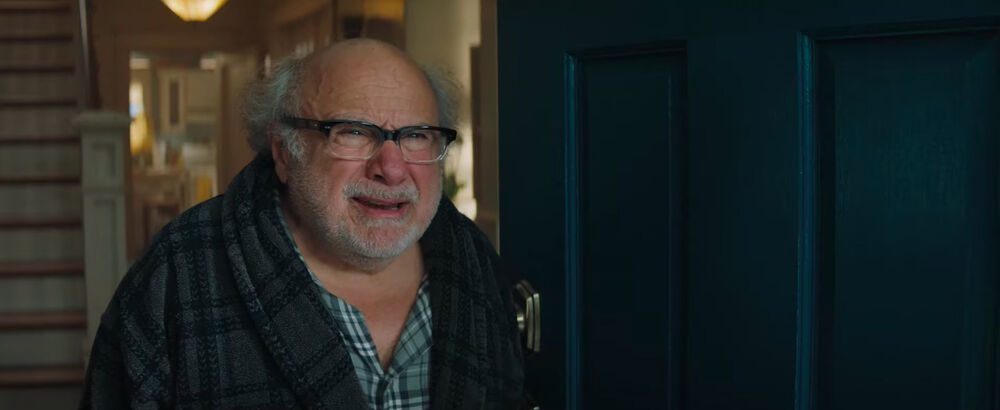
(Credit for this image goes to the user Son of Andross on the Jumanji wiki at https://jumanji.fandom.com/wiki/Eddie_Gilpin?file=Jumanji_Eddie.jpg)
Like the previous entry in the 'Jumanji' series, 'The Next Level' was a fun, amusing thrill ride of a movie. Also like the previous film, it deals a lot with the concept of people developing new perspectives and ways of looking at the world through the characters' adventures in the video game world of Jumanji. In this case, the character whose perspective changes the most is definitely the main boy Spencer's crabby Grandpa Eddie, played by Danny DeVito. Grandpa Eddie is staying with Spencer and his mom while recovering from a hip replacement, and also finds himself having to deal with a surprise visit from his ex- business partner and ex- best friend Milo (Danny Glover). We learn that the two of them used to run a diner together for a long time, but Milo ultimately wanted to retire, and sold the diner against Eddie's wishes, forcing Eddie (Who was the kind of person who believed a man should stick with his job until literally the day he dies) to go into retirement as well. Their relationship deteriorated after that.
When the now- malfunctioning 'Jumanji' game draws some of the characters into it, Grandpa Eddie and Milo are both pulled into it as well. Eddie takes on the game- character Avatar of Dr. Smolder Bravestone (Dwayne Johnson), the mighty powerhouse of an archaeologist. He's not very good at using that character, though, as his cranky, short- fused personality (Kind of comes with the territory with a Danny DeVito role) combined with Bravestone's strength and fighting skills causes the group to be dragged into one unnecessary fight after another and costs the group all but one of their lives. Eventually, the group learns that a game glitch can let them switch their characters, so they have Grandpa Eddie instead take on the game character of master thief/ cat burglar Ming Fleetfoot (Awkwafina), who proves to be a much better fit for him.
For the in- game scenes, both Dwayne Johnson and Awkwafina give spectacular performances as him (And for me to say that about a female rapper with such a ridiculous name, you KNOW that's saying something), truly acting like the spirit of a cranky old man transferred into such vastly different bodies. Seeing Grandpa Eddie learn new things about both Milo and himself, and gradually repair their old friendship, is really nice.
One great example of just how much Grandpa Eddie has changed through his time in Jumanji is his philosophy about aging. For much of the movie's first half, he had the sort- of catchphrase that "Growing old sucks, don't let anybody tell you different!" In the end, in contrast, while hanging out with Spencer, he says, "You want to know something about growing old? (Spencer: "It sucks?") It's a gift." This is a Biblical viewpoint. While the world teaches us that aging is something to be feared and avoided as much as possible (Ernest Hemingway committed suicide for that very reason; He couldn't handle the fact that his great physical strength he had always prided himself on was fading as he grew old), the Bible teaches us that aging can be a very good thing, providing us with experience, wisdom, and the knowledge that God will still be with us, love us, and provide for us. 2 Corinthians 4:16 says "Therefore we do not lose heart. Though outwardly we are wasting away, yet inwardly we are being renewed day by day." Job 12:12 points out "Is not wisdom found among the aged? Does not long life bring understanding?" Psalm 92:14 says that "(The righteous) will still bear fruit in old age, they will stay fresh and green."
In all my time in various churches, I've seen so many elderly people who refuse to let their age stop them from faithfully serving Jesus, and remain strong and active in that way regardless of their years. I've also had many elderly people in my life whose wisdom and guidance have greatly helped shape who I am today, ESPECIALLY in terms of my faith as a Christian.
For those who know Jesus, growing old really can be a blessing. If surly old Grandpa Eddie can come to grasp this truth and use it to change his outlook on life, then so can we.
Now, we go from one character named Eddie, to another:
9. Eddie Kaspbrak, 'It: Chapter 2.'
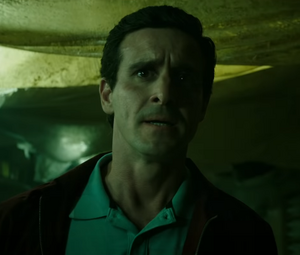
(Credit for this image goes to the user Dalvin98 on the Heroes Wiki at https://hero.fandom.com/wiki/Eddie_Kaspbrak?file=Adult-Eddie-IT-CH-2.png)
In the first 'It' film, in which we see the heroic Loser's Club confront the evil Pennywise as kids, the character I liked the most and took the most from was Richie. In this sequel, however, things went a little differently. While the adult version of Richie is great, the character who stole the show for me was the adult version of the Losers' resident hypochondriac, Eddie Kaspbrak.
While there are some senses in which Eddie remains the same kind of person he was when he was a boy (Still terrified of germs/ sickness, married to a woman who's almost a perfect copy of his overprotective mother right down to being played by the same actress, and still keeps using his inhaler even though he knows it's a placebo), we find that he has grown and matured in a lot of ways, most notably in becoming much braver than the frail, paranoid little boy we saw in the first film. We see Eddie demonstrating some amazing courage over the course of the movie. When all alone about halfway through the film, he is attacked by It in the horrifying form of a hideous leper that It had first used against Eddie as a kid in order to kind of embody Eddie's fear of disease, yet adult Eddie marvelously stands up to the monster, and even getting puked in the face by it (The musical accompaniment to this makes it go from revolting to hilarious in a heartbeat) isn't enough to make him back down as he fights it off. Later in the film, the Losers' old enemy Henry Bowers, now even more insane and dangerous than he was as a teen, attacks Eddie and even stabs him in the cheek, yet Eddie manages to fend him off as well by pulling out that same knife and driving it into Henry's chest (You gotta admit, that takes REAL toughness), and even throws in a zinger about Henry's hairstyle in the process. Lastly, in the climactic final showdown between the Losers' Club and It, we see Eddie land a wonderfully effective blow against It, before sadly being mortally wounded. Even while dying, though, Eddie manages to be a hero one last time, revealing to the remaining Losers the way that they can destroy It for good.
That kind of selfless courage, and from someone who was generally known for his cautious nature, is very much a Biblical trait. In 1 Joshua 1:9, it says "Have I not commanded you? Be strong and courageous. Do not be afraid; do not be discouraged, for the LORD your God will be with you wherever you go.” 1 Corinthians 16:13 says "Be on your guard; Stand firm in the faith; be courageous; be strong." Sometimes, scary moments in our lives can come upon us when we don't expect it (As Eddie's encounters with the leper and Henry happen in 'It: Chapter 2'), yet through trusting in God and His deliverance, we, like Eddie, can find the courage to prevail.
From a cautious little boy afraid to so much as wade into a sewer pipe for fear of contracting a disease from the water, to a brave, strong man who valiantly stands up to a force of pure evil multiple times and dies a hero's death helping to stop it once and for all. RIP, Eddie Kaspbrak.
Now, then, let's finish this list on a positive note, and I can think of no better way to do this than through the use of a great take on one of the most beloved characters Disney has ever created:
10. Genie, 'Aladdin.'
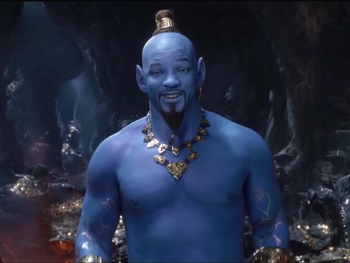
(Pic comes from the user Majorboy123 @ https://hero.fandom.com/wiki/Genie_(2019)?file=Gennie%202019.png)
Come on, it's Genie! Easily one of the best characters in any Disney animated movie, and that greatness transitions well into the live- action version.
The live- action remake of 'Aladdin' nailed most of its elements, and Will Smith's performance as Genie was easily one of the best parts of it (I also really liked the way they handled the parrot Iago in it). While he's not iconic as Robin Williams was, he still truly nails the role. He honors Williams's legacy, yet still finds ways to make the role his own. He also gives a magnificent performance of the iconic song "A Friend Like Me," really knocking it out of the park on that number. His funny moments will have you shrieking with laughter, while a moment near the climax when he tells Aladdin "You're breaking my heart here, kid; You're breaking my heart" will have you near tears.
I'd say a good theological lesson that Genie helps teach is on lovingly correcting a friend. See, one scene in the remake that noticeably differs from the original yet still works well is the scene about two- thirds into the movie when Aladdin and Genie have a bit of an argument when Aladdin decides that he doesn't think he should use his third wish to grant Genie his freedom the way he initially planned to. In the original animated film, the main source of conflict in that scene is how hurt/ betrayed Genie feels over the fact that Aladdin, who he had come to see not just as a master but as a good friend, went back on his word with him like that. In the remake, in contrast, Genie isn't all that bothered by the fact that he apparently won't be getting his freedom, but IS bothered by the fact that Aladdin is becoming too immersed in the false identity he created as Prince Ali. Genie points out that Aladdin has started to build his entire life around a lie, which is obviously a VERY unstable foundation. Genie calls him out on this firmly, not mincing words, but at the same time does so in a patient, kind way as a concerned friend looking out for Aladdin's well- being.
The Bible stresses the importance
of believers, when they notice a friend or loved one starting to stray from the
right path, to assertively but lovingly correct them on it just as Genie tried
to do to Aladdin in that scene. Galatians 6:1 instructs believers that “…if
anyone is caught in any transgression, you who are spiritual should restore him
in a spirit of gentleness.” Also, in Matthew 18:15, stresses that you should
try if possible to keep it a private matter between the erring loved one and
yourself (Again, just as Genie did towards Aladdin), saying that “If your
brother sins against you, go and tell him his fault, between you and him alone.
If he listens, you have gained your brother.”
So, that about sums up Genie, a
marvelous new interpretation of an already- marvelous character. Whether in helping
a “Diamond in the Rough” save a kingdom and win the heart of a princess or in
helping us learn how to carefully call out a straying loved one, we’ve truly never had a friend like him.
A few of my honorable mentions on
2019 characters are the aforementioned Murray Franklin from ‘Joker’ and Forky
from ‘Toy Story 4,’ Billy Batson/ Shazam and all of his foster siblings
(Especially the adorable Darla) from ‘Shazam,’ Theresa “Tree” Gelbman from ‘Happy
Death Day 2U’ (She was also an honorable mention a couple years ago for the
previous film in that series), Tommy from ‘Scary Stories to Tell in the Dark’
(This bully nearly made the list instead of Stella from the same film, as a
cautionary lesson on how people as vicious and mean- spirited as him end up
reaping what they sow), and Sir Lionel Frost from ‘Missing Link' (That movie deserved to do so much better in the box office than it did).
That's it for this edition of the Nightcrawler Experience. Keep an eye out for future entries.Until then, may God bless you all!
No comments:
Post a Comment